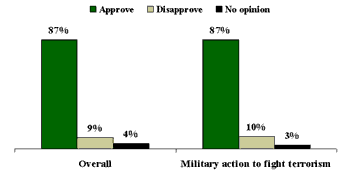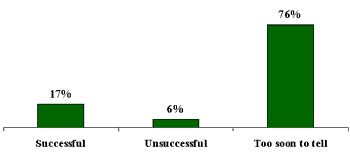GALLUP NEWS SERVICE
PRINCETON, NJ -- Americans persist in giving a remarkably high level of support for the military action against those responsible for the terrorist attacks against the United States. Support for retaliatory action was extremely strong on the evening of Sept. 11 and continued to be strong throughout September. It was strong after the U.S. attacks began on Oct. 7, and remains at almost the same high level in the most recent Gallup poll, conducted this past weekend. At the same time, Americans overwhelmingly say it is too soon to gauge how successful the war has been so far, and less than a majority are strongly confident that ultimately the military action will achieve its objectives.
Support Remains Strong and Consistent
Here is the bottom line: Between 86% and 92% of the American public has supported military action throughout the two-month period since Sept. 11.
Most recently, in the CNN/USA Today/Gallup poll conducted over the Nov. 2-4 weekend, 86% of Americans say they approve of the current U.S. military action in Afghanistan. The vast majority of these say they approve strongly. Only 11% disapprove of the military action, 6% strongly:
Do you approve or disapprove of the current U.S. military action in Afghanistan?
Do you [approve/disapprove] strongly or only moderately?
|
Strongly approve |
Moderately approve |
Moderately disapprove |
Strongly disapprove |
No |
|
|
2001 Nov 2-4 |
71% |
15 |
5 |
6 |
3 |
This latest measurement of support for military action is remarkable not only because it is so high, but also because it represents the latest installment in a very consistent pattern.
Here is the first question Gallup asked about military action on the evening of Sept. 11, just after the attacks:
Which comes closest to your view -- [ROTATED: the U.S. military should conduct military strikes immediately against known terrorist organizations, even if it is unclear who caused today's attacks, the U.S. military should only conduct military strikes against the terrorist organizations responsible for today's attacks, even if it takes months to clearly identify them, or the U.S. military should not conduct military strikes in response to today's attacks]?
|
|
Should wait |
|
|
|
|
2001 Sep 11 |
21% |
71 |
4 |
4 |
Only 4% said the United States should not conduct strikes, while 92% were willing to sanction some sort of military action, whether it began immediately or after those responsible for the attacks were identified.
On the following weekend, Sept. 14-15, the Gallup poll contained the following question:
Do you think the United States should -- or should not -- take military action in retaliation for Tuesday's attacks on the World Trade Center and the Pentagon?
|
Should |
Should not |
No opinion |
|
|
2001 Sep 14-15 |
88% |
8 |
4 |
Here again, about nine out of 10 Americans reported that in concept they agreed with the idea of retaliatory military action.
Such military action actually began on Oct. 7, and that evening in a special instant-reaction poll, when Americans were asked whether they approved, almost the same percentage -- 90% -- said yes:
Do you approve or disapprove of the U.S. taking military action in Afghanistan today?
|
Approve |
Disapprove |
No opinion |
|
|
2001 Oct 7 |
90% |
5 |
5 |
And, in two polls since the attacks on Afghanistan began, support for the military action has been between 86% and 88%.
Liberals, Democrats, Nonwhites Most Likely to Disapprove
Our analysis suggests that there is no specific group in America among whom levels of disapproval are extraordinarily higher than average. Eleven percent of all Americans currently disapprove of the military action. Twenty percent of self-identified liberals and of Democrats disapprove, but these are relatively minor differences.
Nonwhites, a classification that includes blacks, Asians and others who do not identify their race as white, are also somewhat more likely than the general public to say they disapprove of military action (24%), as are young people aged 18-29, 19% of whom disapprove. And, as would be expected, the very small number of Americans who disapprove of President Bush's overall job performance are much more likely than the average American to disapprove of the military action.
President Bush Gets High Marks
President George W. Bush continues to get high marks for his leadership of the war effort. His overall job approval rating is now at 87%. His approval rating for handling "the U.S. military action abroad to fight terrorism" is at exactly the same level.
| Bush Job Approval |
 |
| Nov. 2-4, 2001 |
Progress?
Despite these high levels of approval for the war effort and for President Bush's leadership, satisfaction with the "progress made by the U.S. military in the war" is somewhat mixed. Although 79% of Americans say they are satisfied with the progress of the war, only 27% are strongly satisfied. Eighteen percent are dissatisfied with the military's progress.
The fact that almost eight out of 10 Americans are at least somewhat satisfied with the progress of the war, on the other hand, may be surprising to some observers given the fact that thus far, there have been no highly significant, measurable successes or goals achieved in the war. That appears to be okay with Americans, most of whom say it is still too early to judge how successful the war effort has been:
| Military Action in Afghanistan: Successful, Unsuccessful, or Too Soon to Tell? |
 |
| Nov. 2-4, 2001 |
At the same time, the American public is not overwhelmingly confident that the United States will ever achieve three specific objectives: capturing or killing Osama bin Laden, removing the Taliban from power, or destroying all terrorist operations in Afghanistan. While at least six in 10 are at least somewhat confident that the United States will achieve these objectives, only between 17% and 42% say they are very confident. Americans are most confident that the Taliban will be removed from power, and least confident that the United States will destroy all terrorist operations in Afghanistan.
How confident are you that each of the following will happen -- very confident, somewhat confident, not too confident, or not at all confident? How about -- [RANDOM ORDER]?
A. The U.S. will capture or kill Osama bin Laden [Oh-SOM-ah Bin LAH-den]
|
Very confident |
Somewhat confident |
Not too confident |
Not at all confident |
No |
|
|
2001 Nov 2-4 |
27% |
39 |
22 |
9 |
3 |
B. The U.S. will remove the Taliban [Tal-uh-ban] from power in Afghanistan
|
Very confident |
Somewhat confident |
Not too confident |
Not at all confident |
No |
|
|
2001 Nov 2-4 |
42% |
41 |
11 |
4 |
2 |
C. The U.S. will destroy all terrorist operations in Afghanistan
|
Very confident |
Somewhat confident |
Not too confident |
Not at all confident |
No |
|
|
2001 Nov 2-4 |
17% |
45 |
27 |
9 |
2 |
Ground Troops
When Americans were asked two weeks ago if they favored or opposed "the U.S. using ground troops in Afghanistan," 80% approved.
This past weekend's poll included a question that was more specific, stressing the idea that there would be large numbers of troops and that they would be in combat roles. Support for ground troops based on this specification was somewhat lower, but was still at about the two-thirds level.
In general, a review of polling conducted on the issue of ground troops shows that projected support -- as is almost always the case in these types of questions -- varies, depending on exactly how the hypothetical situation is phrased. The lowest levels of support for the use of ground troops occur when the question specifies that there would be large numbers involved and that there would be large numbers of American dead and wounded. The highest levels occur when the question simply uses the phrase "ground troops" with no further specification. Still, no matter how strongly the possible negative consequences of ground troop involvement are stressed, almost all questions have found that a majority of Americans remain resolute in their support.
Survey Methods
These results are based on telephone interviews with a randomly selected national sample of 1,012 adults, 18 years and older, conducted Nov. 2-4, 2001. For results based on this sample, one can say with 95 percent confidence that the maximum error attributable to sampling and other random effects is plus or minus 3 percentage points. In addition to sampling error, question wording and practical difficulties in conducting surveys can introduce error or bias into the findings of public opinion polls.
